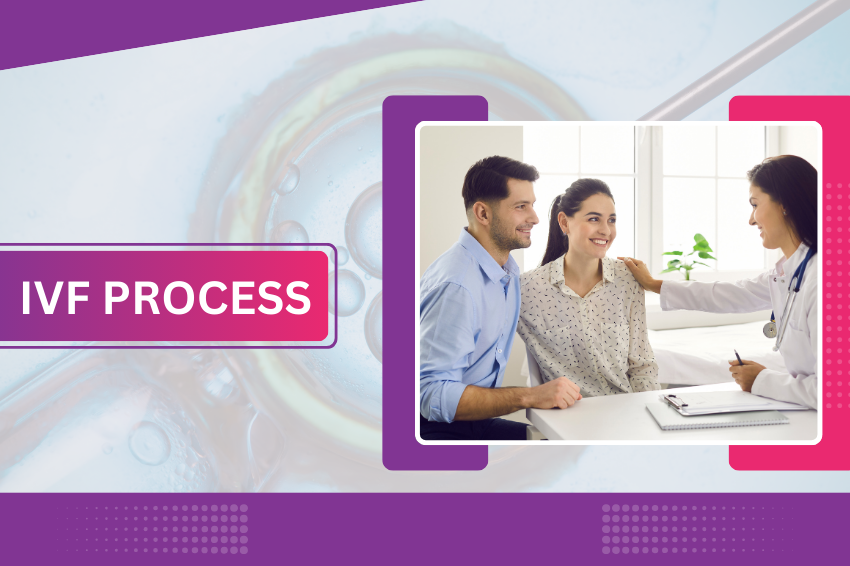IVF is a technique in assisted reproductive technologies that has provided an answer to many childless couples’ prayers around the world. Due to it being a way of conceiving which gets over the normal barrier of fertility, IVF has become one of the most commonly used approaches globally. IVF process starts with ovarian stimulation where drugs are administered to stimulate the production of more than one egg to increase the likelihood of the sperm to fertilize the egg.

In the later stage, the eggs are removed from the female partner through a relatively simple surgery, and then sperm is introduced for fertilization to occur outside the woman’s body. Such embryos are observed for the pattern of development before being smoothly slid to the uterus.
IVF is a greatly coordinated process which not only opens up a way to parenthood for those individuals facing fertility issues, but also presents an opportunity to know the pre- implantation genetic disorders. With new and improved IVF technologies emerging every other day, gaining as much knowledge as possible regarding the process becomes prerequisite when intending to undertake an IVF procedure.
This article explains all the IVF process in details with an aim of unraveling the mystery behind of making a family.
What is IVF?
In Vitro Fertilization (IVF) is an advanced reproductive technique used to help couples who cannot achieve a pregnancy naturally due to hormonal disturbance, low sperm count, blocked tubes, endometriosis, problems with the ovary, and many other conditions.
IVF is not one procedure; it is a journey with multiple steps in which you will feel mixed emotions, like sometimes you will feel happy and sometimes a little scared. But continuing advances have revolutionized IVF success rates, and it is one of the most effective fertility treatments available today.
But this is not only a medical procedure: it is a life-affirming journey that gives an unimaginable amount of joy to families who believed they would never be parents.
Who is the Candidate for IVF Treatment?
IVF treatment is recommended for those couples who cannot conceive naturally due to various reasons. So, let’s discuss who those candidates are:
- If the women have an ovulation disorder like PCOS
- If women have blocked or damaged fallopian tubes, endometriosis
- Women who have unexplained infertility
- If a male is facing issues like low sperm count or poor sperm, or erectile dysfunction
- If women have recurrent miscarriage
- If women are over 35 years of age, then it can also affect their pregnancy, as it reduces the quantity and quality of the egg.
- LGBTQ couples, gay couples, single parents, and cancer patients
- If you want any other guidance, then consult the IVF Clinic.
Pre-IVF Process:
Before going for the IVF process, you should follow some of the important steps so that your body and mind are in the best possible condition. The following steps are:
- If you are looking for IVF, then eat a balanced and nutritional diet, maintain weight in the healthy range, exercise, and stay away from alcohol, smoking, junk food, etc.
- Stress is one of the major issues that matter, so if you are planning to start with IVF, gather stress management skills, because if you are running persistently in stress mode, then you are putting your journey at risk.
- Find ways to unlock your mental well-being, like sleep, some cool music, walks in a proper open area, therapy for emotional support, communication with your spouse, etc.
- Refrain from using non-eco-friendly items like plastic and other environmentally unsafe stuff; one can use alternative ways and avoid chemical contact or such substances during these tough times.
- Plan your finances accordingly because it can be an expensive process.
- Prepare for the emotional and mental state of things, as IVF is a multi-step process needing a positive state of mind and patience, and also needs a support system, which can be obtained from your partner, friends, and family.
Step-by-Step Process of IVF
IVF is not a single process that requires a day. It’s a multi-step process that requires weeks. IVF is a process in which the egg is taken out from the woman’s ovaries and fertilized that egg with men’s sperm outside the body that is in a laboratory, and then transferred back into the woman’s uterus. So, it involves the following stage:
Initial Consultation
The process starts with a consultation with a fertility specialist, in which they first ask you about the medical history of both partners. Then they run some tests, like the hormonal test, blood test, ultrasound scan, semen analysis, and any additional tests if required to process the further treatment.
Ovarian Stimulation
After knowing all the details, your fertility specialist stimulates the eggs in the woman’s ovaries so that her body can produce multiple eggs in one cycle only instead of a natural cycle. This is called ‘controlled ovarian stimulation’. It can be done by administering fertility medicine or an injection. Further, IVF process is carefully monitored by regular ultrasound and blood tests so that we can track the follicle growth and hormone levels. It can take a time of 10-14 days.
Egg Retrieval
Once the ovarian stimulation phase has ended, your fertility specialist will initiate the process of egg retrieval. When the egg has matured, the doctor does a minor surgical procedure through a minimally invasive procedure where the patient receives very little sedation. An ultrasound-guided thin needle was then inserted into the ovaries to retrieve the eggs. It typically takes 15-20 minutes, then you can leave for home.
Semen Collection and Fertilization
The fertility specialist collects semen from your partner or a sperm donor on the same day as egg retrieval, selecting only healthy sperm. The fertility specialist combines the semen with retrieved eggs for fertilization. This fertilization can be done in two ways, either by conventional IVF or ICSI (Intracytoplasmic Sperm Injection), in which the sperm is directly injected into the eggs. And get into the process of fertilization.
Embryo Development
Now the fertilized eggs are called embryos. Embryonic development can take 3 to 6 days after the fertilization process. Furthermore, daily monitoring takes place so that later on, it can be decided which embryo is best for transfer.
Embryo Transfer
After the embryo development, your fertility specialist selects the best embryo, and then, by using a thin catheter, the embryo is placed into the uterus. This can be done on day 3 or day 5. The process is painless, and it can be done without taking the help of anesthesia. But you can experience mild cramps. Moreover, for this procedure you should have a full bladder, so drink lots of water.
Embryo Freezing
This is not a procedure, but if healthy embryos are left from the IVF process, then they can be frozen and stored for future fertility treatment.
Resting and Waiting
After the procedure, you should be relaxed or stress-free between the time of embryo transfer and the pregnancy tests. You can do normal activities, but not those activities that take more energy from your body. All you have to do is be happy in that particular phase of time, with the removal of negative thoughts.
Pregnancy Test
And after 2 weeks, you can take a pregnancy test.
Post-Procedure Care – After IVF
Embryo transfer is one of the crucial stages in which the woman has to take precautions, too. So, let’s discuss the post-procedure care:
- Take enough rest once you are back home and avoid physical activity as much as you can, especially strenuous activities like running, jumping, etc.
- If you travel to work, then try to avoid it because it can affect your mental health.
- Manage your stress as much as you can. After the embryo transfer, women think about the results only, which later on causes stress. So, think positively and manage your stress by doing activities that you like to do and activities that provide happiness.
- Follow a healthy diet. If your embryo transfer is successful, then for the development, it is essential to follow a nutritional diet and avoid those things that can be harmful to your body and, most importantly, stay hydrated.
- Don’t use harmful things such as a hot bath, excessive heat exposure, alcohol, smoking, and caffeine, since this can impact embryo development.
- You should not take the drug without asking your physician whether it is vitamins, herbal supplements, or any other medicines.
- Pay attention to your body. Mild symptoms such as cramping or spotting are normal, but if you notice something else or sudden changes in your body, contact your doctor immediately.
- Take medication and care for yourself after the embryo transfer as your doctor recommends.
- The most important thing: do not take a pregnancy test too early; it may produce a false result and can cause unnecessary stress and influence embryo development. So, give it at least 14 days, and please consult your doctor before testing it out.
Best Age for IVF Success
One of the common factors is age, which affects the IVF success. The best age for IVF is 25-35 years.
- If the woman is in her early 20s or 30s, then she has the highest success rate of IVF.
- If women are in their mid-30s, then the chances of success can be moderate, but it is not that difficult to get positive results if you take precautions.
- If the woman is 40+, then the chances of success can be lower. In this age, egg donation is recommended.
But due to day-to-day advancements in IVF, the success rate has increased, and women can achieve pregnancy with the right treatment plan without taking on the stress of age. All you need is to consult an IVF clinic.
Conclusion
In vitro fertilization (IVF) has revolutionized fertility treatment and helped millions of couples who have difficulty conceiving the opportunity of parenthood. Due to developments in reproductive technology, the process of IVF has become more successful with high success rates and has increased the chance of conceiving even under the most complex medical conditions.
It can be a physically, emotionally, and financially exhausting process, but the opportunity to hold that baby in your arms makes it all worthwhile. So, couples with complex fertility issues should not lose hope and should start to consult a certified doctor who provides IVF treatment.
Apart from a certified doctor, you should be considering the success rates of the clinic, the expertise of the doctor, and transparency in treatment, as well as emotional support services, before making a decision. Because fertility treatments can be a long road filled with ups and downs, they warrant an environment that’s encouraging, understanding, and patient.
By making informed decisions with your mind as well as heart and the right medical team, couples can feel confident through their journey that they are on the right path to realize their dream of becoming parents.


